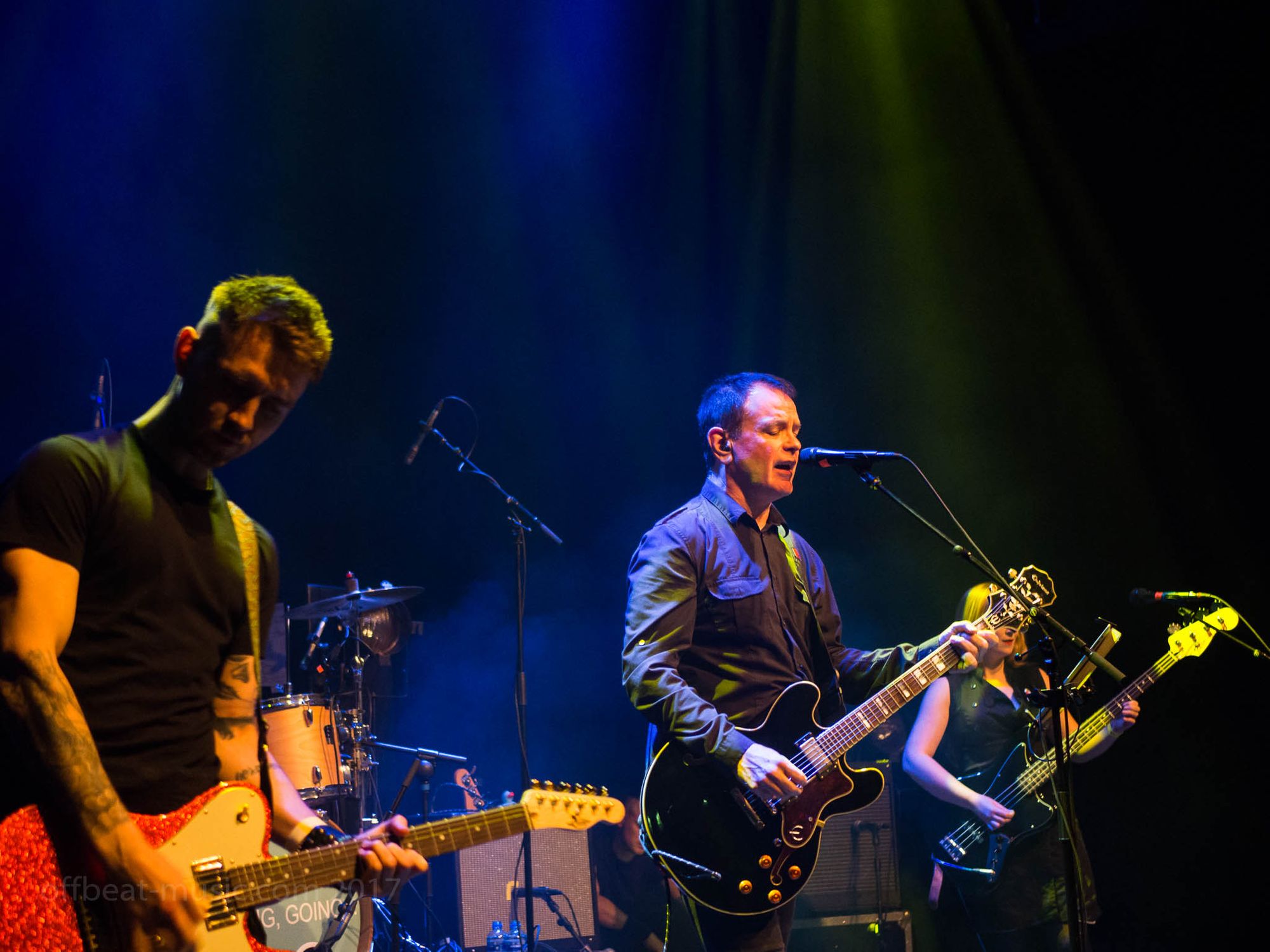If you are standing outside a venue in a picturesque pedestrian road of a small town and cars with registrations from far away trundle searchingly by and a guy wondering why his friends took him for his birthday, realises exactly, is on the verge of tears, then you know, something big is going to happen. The man overcome with emotion shouts “George Best” pointing at a gig poster in the window and “You are taking me to a Wedding Present concert!!!” That is exactly where his friends have taken him. The Wedding Present play the Nieuwe Nor venue in Heerlen, the Netherlands on occasion of the 30th birthday (oh my!) of their very first album “George Best”. Read now all about that: The Wedding Present @ Nieuwe Nor Oct 21st & interview!
Everyone still had to bade some time at he Nieuwe Nor in Heerlen: First up were support act Strugglers who delivered pretty gloomy hard rocky stuff but musically crafted well and then at 9.30 pm CET the mighty Wedding Present entered the stage with David Gedge on vocals and guitar, Danielle Wadey on bass and vocals, Marcus Kain on guitar and Charles Layton on drums.
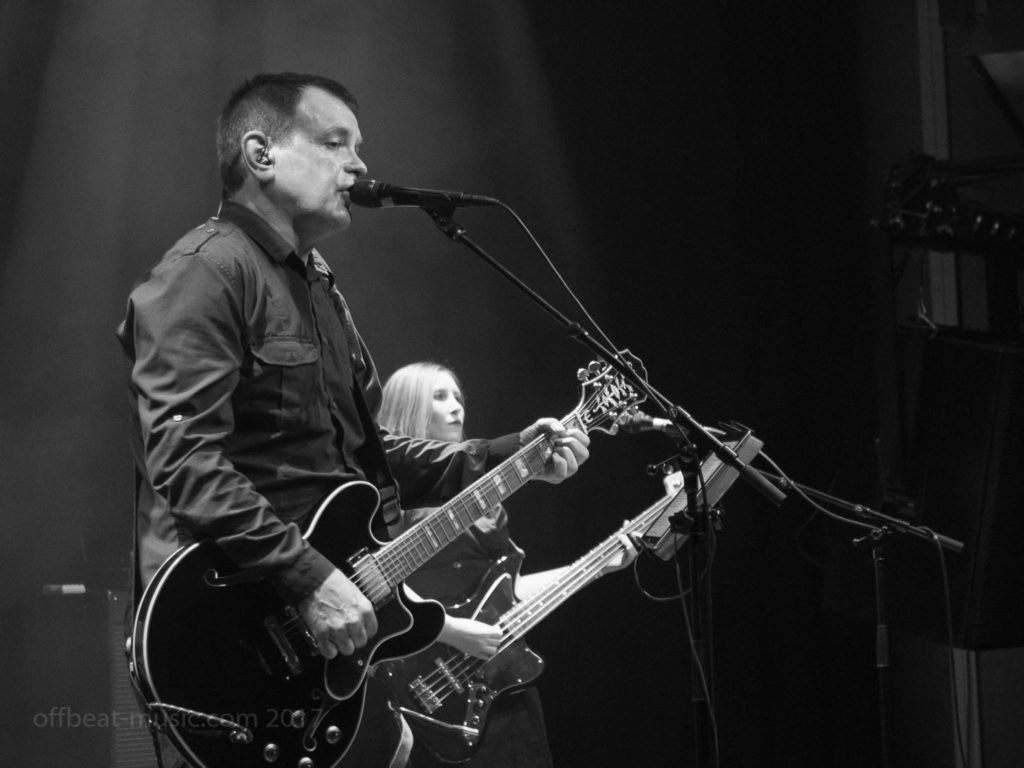
Sure enough, the promise of “George Best”, The Wedding Present’s first, meanwhile cult album, being performed in full attracted a big and enthusiastic crowd especially since it was announced that this would be the very last time that this event would take place on mainland Europe. Don’t fret, you can still catch up with them (in Germany for instance, with the wonderful Precious Few as support act). Tour dates are here.
But this was far from a retro gig. Sure enough, all of us did a bit of time-travelling during the “George Best” set, each in their own way, some dancing and laughing, some almost crying, some with closed eyes. But there was a brilliant selection of songs from other albums too, also from the masterpiece that their new album “Going, going…” is (no “Brassneck”, no encores – look, this is tradition!) Even “George Best” tracks were delivered in a fresh style that made me want to run out to the kids outside the venue listening to techno, shake them and drag them in to tell them: This stuff is thirty years old – just listen to it, will you listen? No, I did not…wouldn’t want to miss a second of this gig. And whereas I sometimes during concerts get a bit tired or woozy or there are kind of lows in the gig…nothing of this here. One and a half hours flew by like nothing at all. This time-travelling mallarkey seems to be a great thing when undertaken properly!
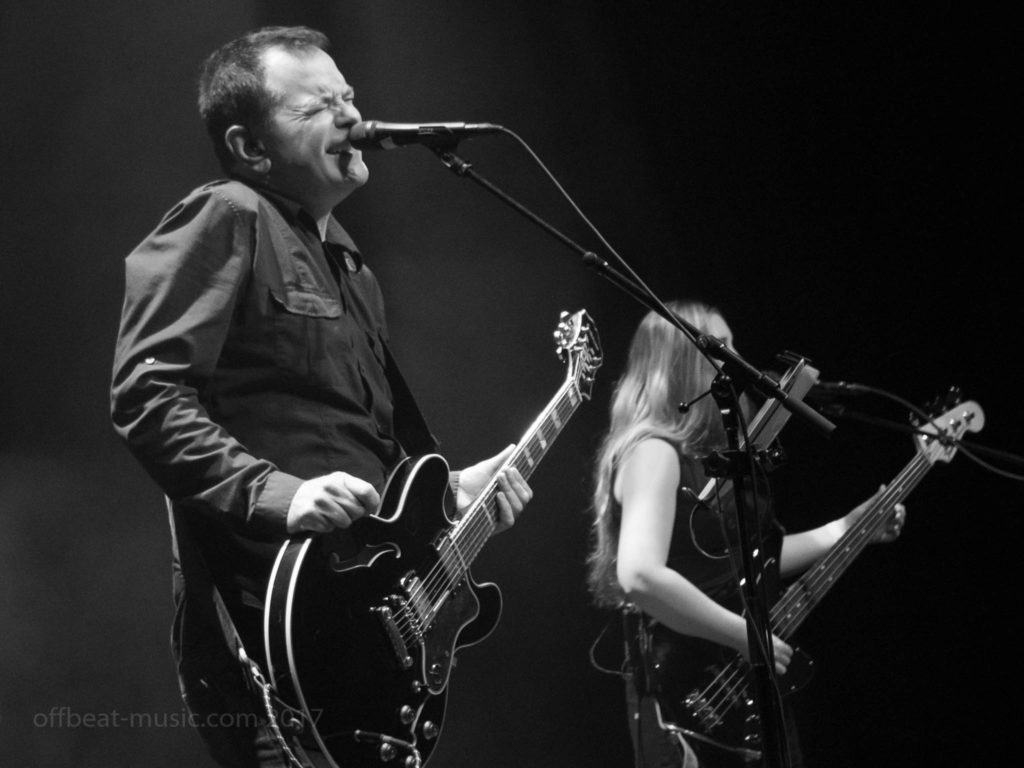
Part of the freshness in delivery were of course first of all Danielle, Marcus and Charles giving a new spin on the classics in a tight performance and then David clearly enjoying the album – see interview below.
Indeed, David Gedge kindly took some time out on busy day and spoke to the blog about a lot of things. Enjoy and off to the gigs you go!
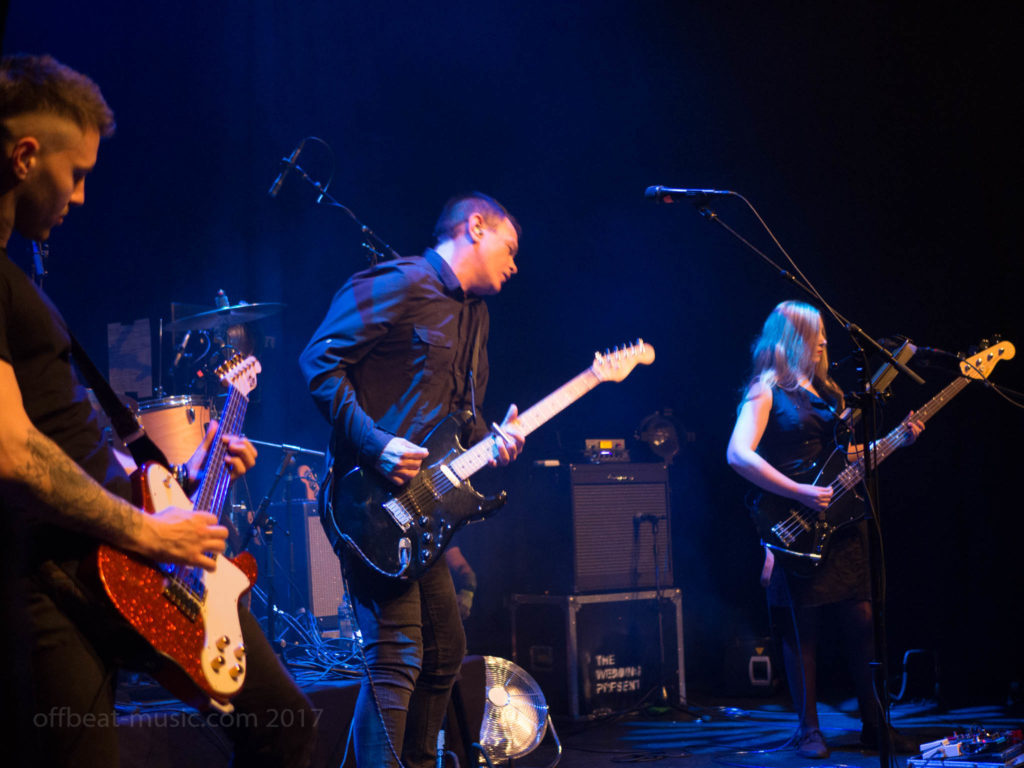
Offbeat Music Blog: Thank you very much, David, for taking the time on yet another long, strenuous tour!
David Lewis Gedge of The Wedding Present: No worries!
OMB: Let us start at the very beginning if you would. Did you come from a musical family or was it really the punk movement – everybody can do it – that got you into music?
David: Not a musical family in the sense that anybody played anything. But there was always music going on. My parents met in the fifties, in the rock n roll era, so they had a lot of old 78s and 45s from that era going on through to the sixties. So there was always plenty of music being played. But none of them had any idea of wanting to become a musician. Punk certainly had an influence on me because it did open the world to normal people who weren’t classically trained (laughs). You just want to start a band really. Also, I went to school with a band, friends of mine, a band from Manchester called The Chameleons. I don’t know if you know them. I went to university at the same time they formed The Chameleons. The next thing I knew, they had a session for John Peel on Radio One and they signed to Epic Records, releasing singles. And I was thinking, mmmh, wait a minute (laughs), I could do this as well. So when I finished my university course, I decided to take it seriously and start The Wedding Present basically.
OMB: Funnily enough, one of my first interviews when I was still at school was with The Chameleons.
David: Full circle!
OMB: Their drummer John recently died…
David: He did, sadly, yeah.
OMB: Thinking about school days: I always wanted to go to the UK, not to London or the landscapes but to the northern big cities in all their post-industrialist gloom because that produced two good things: Football players and musicians. To a certain degree, it is still a bit like that, but not so much. How do you think, the music scene up north has changed? Do you still see as many young people going for it?
David: I don’t really know to be honest. Certainly, in that post-punk era in the 80s against the 90s, it was a hotbed. There were so many bands coming out of Manchester, Leeds and Glasgow and places like that. Nowadays, I don’t really see it as that focussed on those areas anymore. The bands seem to be everywhere really. I don’t know whether that is because of the internet. It is not quite in centres as it used to be, I think.
OMB: Would you think the youth culture is maybe a bit different now? More consuming rather than creative?
David: The youth culture is different in that we had only music and football basically (laughs). But nowadays there is so much more for kids to do. They can watch movies on their phones and computer games. The world is wide open. There is more choice. Also, there is less money in the music industry these days. I speak to some managers who work with new bands. They always say, it’s rich kids because no one else can afford to pack their job in and go off on tour unless they have got some kind of financial support or kind of family money. It is harder for kids to be in groups these days because nobody buys records anymore. That’s changed it as well, I think.
OMB: You live in Brighton now. You are a Southerner now!
David: Yeah (laughs).
OMB: You also do a festival in Brighton. Would you like to say something about that?
David: I think we did the ninth one this year. We do it (At The Edge Of The Sea) every year. It came because we were on tour once and we were in a cafe and talking about being a musician you meet a lot of people and have a quite intense relationship with them on tour, support bands or people you work with. And then you don’t see them again. You might see them again in ten years, going: “Hello, remember us?”
We just thought it would be nice if we had this event where could see the bands that we like as people or their music again. So we hit on the idea of this little festival. It is not a big thing. It is just in a venue in Brighton and we invite people who…to be honest, it is like being a kid in a sweet shop – I just go crazy. It is bands that I like or bands we toured with and got on with. Sometimes it is ex-Wedding Present members who have a new projects, so they come and play. It is kind of one of my favourites things to do. It is like Christmas almost. A lot of hard work because there is a lot to organise but it is such a good thing to be involved with.
OMB: You have always done things on the side, that is if there is time for things on the side really.
David: I think, we make time. Well, I make time. I never wanted us to be one of those bands who write songs, make an LP, go on tour, write more songs, make another LP, do another tour…I always wanted to do separate projects, Cinerama and the festival and there is loads of things that go off a tangent…have strange ideas and if you can make it work it is worth doing. It is more for me than just the music. It’s all the other things as well.
OMB: During your longish hiatus (1997-2004) you worked as Cinerama which eventually merged back into The Wedding Present. But do you have Cinerama still going on the side as well?
David: Very much so! Actually, it is one of the benefits of the festival that we do every year that Cinerama always plays. So we do at least one thing every year and get together and rehearse. Also, in the last few years we have been doing more. We did a concert in London a couple of years ago where we played with a string section, a flute player and a trumpet player. We filmed that and released it as a DVD. Just recently The Wedding Present played in London, in fact last week, and Cinerama supported them. Again we had strings and a choir. It is kind of there as a side project, like a hobby, but it comes to life when there is an opportunity. It is quite expensive! The problem with Cinerama is that it is really expensive to do in its real form because it involves a lot of musicians (laughs) who don’t play together very often. So we have to rehearse quite a lot which costs time and money. And it has never been as successful as The Wedding Present, so the economic argument for doing Cinerama is not really great (laughs). But we like to do it when we can.
OMB: To further creativity and to be inspired by it?
David: Yeah, it is a different kind of music. I always enjoyed that kind of filmic pop music and strings. The Wedding Present really is a guitar band. It is just nice to deviate now and again and do something different.
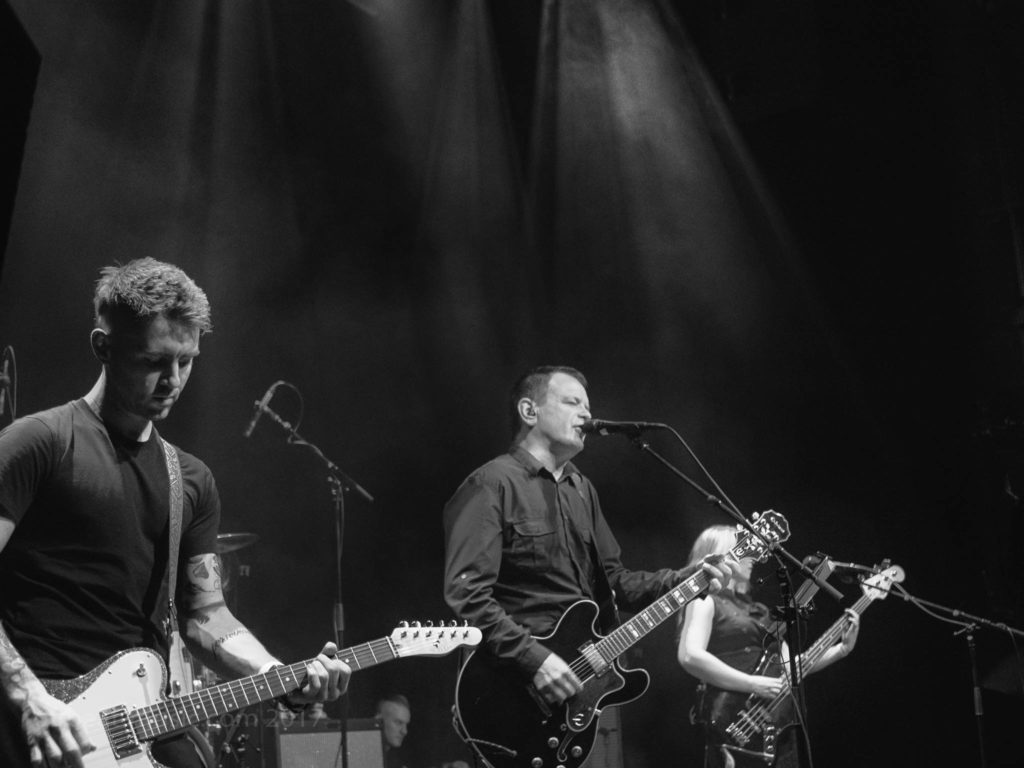
OMB: During your time with The Wedding Present you have been on many labels, your own, independent ones and major labels where you – which was unheard of – kept a high degree of control over your output as well. Now you are back to releasing via your own label Scopitones again. Was that always important to you to maintain the control over your output? Also, with so many changing band members, how was it there, did you let them do something?
David: Yeah, it depends on the project really. I’ve always said that The Wedding Present is made up by everyone who is in the band at the time. So I am not this kind of dictator who says: “This is what we are going to sound like!” I’d be stupid to do that to be honest, because one of the advantages to have all these different people through the years is, they come up with different ideas and different musical tastes and inspirations. Often pushes it in a different direction. But yes, I have always been bloody-minded in having that control and the reason why I started the label Scopitones a few years ago was: We used to have our own label and then we signed to RCA Records and that was fine. Then we signed to Island and that was fine. They were both major labels. Then we signed to Cooking Vinyl which is an independent label and we had less control which was weird to me. Because you think it would be the other way round. After releasing a few things on Cooking Vinyl, I decided that it is not that it is a big label so I am not making lots of money from it. I might just do it myself again and then have total control again. And we hired the same people Cooking Vinyl used, but this time I own the rights and it is totally my baby. We have gone back to doing it ourselves really.
OMB: The control issue with the smaller label is probably a financial question as well.
David: That’s the problem. With RCA we were very lucky because we signed in the 80s when there was a lot of money flying around, so anything we wanted there was no question of a problem. Whereas when we got to Cooking Vinyl, the music industry was in decline a little bit and they were a small label. It was more a budgetary thing rather than a creative thing but even so. I don’t want to write songs, make records and then have a business person sat in a room telling me what to do, do you know what I mean? That hampers the artistic freedom and it is important. I can understand why it is not important for some people who are quite happy to be told what to do. Maybe they want that. In The Wedding Present it has never happened and I can’t imagine that it ever would really.
OMB: You seem to be able to day when making records: “Okay, I leave it like that.” And it sounds still a bit raw and not producing the bejaysus out of something even though with a major label you would have certainly had the opportunity to do that.
David: (laughs) We probably even got more extreme as we went along on those major labels. I think we were lucky because again, the people who signed us, especially RCA had a position of power. But because they’d signed us, we got what we wanted really in terms of engineers and producers. Yeah, but it is the traditional kind of major method to get this kind of band and then bring in a producer and a stylist and take that sort of refuge. But it never really happened to us. Maybe it should have, I don’t know! (Laughs).
OMB: I think, most people like The Wedding Present they way they are really. You are celebrating the 30th anniversary of “George Best” on this tour (which is a bit painful, reminding me of my age). I think when you did the 25th birthday tour, you were first not so sure about doing this.
David: No, right. It was the twentieth actually. There was an idea of a re-release which never happened in the end. But it was supposed to come out in a special format and the label wanted to do that and they suggested we play it live. And I said no, that’s like nostalgia and I am an artist and I am looking forward to the next album rather than looking back. But then I went away and spoke to a few people, my friends and people in the band and fans and everybody said: “Oh yeah, you should definitely do that. That would be brilliant. I’d love to see you play “George Best”. Because when an album first comes up, you don’t play the entire thing because it is new. You intersperse it with other songs people know. So we said we should try it. And I was: “Yeeeeah, okaaaaay.” I suppose, I was a bit unenthusiastic. Then, when we started doing it, I realised I was actually enjoying it. It is very interesting and a bit surreal to actually go back and look at stuff you’ve done twenty, thirty years ago and then reimagine it with a new band really. And it is interesting how they interpret everything differently and for me also, it is like looking at an old diary. Because I changed quite a lot in those thirty years, as people do. It’s almost like I am covering myself. I am covering these songs by a songwriter from thirty years ago which happens to be me. And now I think it is fascinating – I love doing it. Especially “George Best”, it is a really frantic set, very powerful and fast and energetic. It’s really good fun to play live actually.
OMB: Buffalo Tom have done this recently and I think, were a bit apprehensive first and then really enjoyed it and seeing how the songs had evolved.
David: Yeah, exactly! I also came to this philosophical conclusion: The past is as important for a band as the present and the future. I did an interview actually where the person said, by doing older records, aren’t you hampering the stuff you are doing now and in the future. I don’t see that really. In the last few years we have done “Bizarro” and “Seamonsters” just like “George Best” – we did them live. But we still released three albums and still have written new songs. Again, it is like Cinerama, a side project that we occasionally do. I didn’t even plan to do “George Best” to be honest…it only happened because someone last year called me and said, oh, we have this festival in Manchester. Would you be prepared to play “George Best” as part of its 30th anniversary? And I said: “What??? Thirty years already?” It seems not so long ago that it was the 20th anniversary. I was actually quite surprised but again, I asked the rest of the group and they said: “Yeah, we should do that.” So we said yes. We got more invitations as people realised and then we thought we do this little tour. So, this one came as a little more of a surprise to me actually. So maybe we are going to do thirty years of “Bizarro” and “Seamonsters” next, who knows?
OMB: For me it is kind of an out of body experience listening to “George Best” now. It seems far away and at the same time it catapults you back right there and you can sense the atmosphere like it was with the sounds and feelings and smells even.
David: That’s exactly why I like it. You hit the nail on the head there. It is something distant, you never think about it. But then, as soon as you start doing it, you are right back there which is very odd.
OMB: You spent some time in the US. Do you see a certain influence on your music?
David: Totally, yeah. Throughout the history of The Wedding Present we have always been interested in North American bands as well as European bands. A lot of “George Best” is this kind of Velvet Underground chord but just really fast (laughs). Then Sonic Youth and Television and all these bands from the American underground have always been influential…Pavement.
OMB: Pixies?
David: Pixies, yeah. Pixies influenced us because Steve Albini as recording engineer. I remember when their “Surfer Rosa” album came out, I was: “This sounds amazing.” Great songs, but also just sounded brilliant as well. And it was Steve Albini recorded that and so we asked him to record “Seamonsters”, our third album. We always had one foot in America and one foot in the UK, even physically these days.
OMB: If you could sort of say very shortly about each of your albums what you had in mind or wanted to achieve when you made it. (We are a bit late and It is dinner time and plates are being banged and people start flooding in and chatting, but this won’t be obvious in the written format here, so on we go…)
David: (chortling and thankfully going on despite maybe at this stage dying with hunger) With “George Best” we really had no plans. We were just happy to make a record. All the songs we had at the time, we just played them. (David’s very lovely wife comes in and brings the equally lovely Doris, their wee dog, to David for some quality time between driving and soundchecking and interviewing and performing. Doris is being interviewed on the life as a touring dog as well).
Then, “Bizarro” was almost the album that “George Best” would have been if we had thought about it a bit more. It is more of a structured record really with more variety and dynamics.
“Seamonsters”: We wanted to get a bit away from that jangly guitar pop and indiepop stuff. So we used Steve Albini. It is more of a dark rock record I suppose.
“Hitparade” (1 and 2), I don’t really see as an album. It was twelve singles.
OMB: And the covers.
David: And the covers, yeah. What’s the next one?
OMB: “Watusi”.
David: “Watusi” is very interesting because we were really interested in these layers of guitar sounds and distortion and noise. But then we had this kind of idea, what would people do without that – if they didn’t have these guitar pedals and these big rock sounds. “Watusi” was more of a look back to the sixties and seventies. What did people do then to achieve this kind of dynamics?
“Saturnalia” is the most experimental record actually. There are some very odd arrangement ideas in there. We wanted to make a record that was a little more challenging.
Then came the Cinerama time. What next? Oh, “Take Fountain”. “Take Fountain” was going to be a Cinerama LP actually because it was still Cinerama at the time. But then as we were making the record we decided it sounded more like a Wedding Present album. So we released it as a Wedding Present album. That is almost like an album where the two bands join.
“Valentina” was interesting because our drummer at the time became the guitar player. We switched instruments. A lot of the songs are rhythmically interesting. It wasn’t straightforward kind of beats which I thought was cool. Oh, I missed one: “El Rey”.
“El Rey”: We went back to work with Steve Albini again in Chicago. And then “Valentina”. And “Going, going…”.
“Going, going…” is my favourite one but that might be because it is the most recent. It is a concept album basically. It is a story that goes through the twenty tracks and the lyrics are linked and the music is kind of linked. The music, I wanted to go somewhere different but at the same time make references to The Wedding Present’s and Cinerama’s past. It was quite a complicated record to make.
OBM: I call it The Wedding Present’s Ulysses.
David: I remember you saying that on the phone. Yes, it is.It is not a straighforward record. I did not plan for it to be a double LP (laughs). It just became that because of the size of the project.
OBM: Lyrically, you have the seal of John Peel of having written some of the best love songs ever. What more can you ask for? They are usually of the platonic or unrequited or broken up kind…
David: I try and cover a whole range really. It is such a big subject.
OBM: Is there autobiographical stuff coming in?
David: Some autobiographical, some less so. Some from my point of view, some from somebody else’s point of view. I am just very fascinated with the thing people say to each other, especially inside relationships, starting or ending. It works really well in pop songs. If I think back to my favourite songs in the fifties and sixties, it was love songs, then punk. They are the most meaningful lyrics to me.
OBM: So you wouldn’t see yourself as doing political songs?
David: I’d like to and I have tried occasionally but I have just never been as happy. I’ve always thought, it is a bit clumsy. I should probably leave it to people who know how to do that (laughs). I am quite happy to be stuck to my field.
OBM: One last thing for you. You said somewhere, your voice has changed a lot. Even though I think the range both musically and atmospherically has increased considerably, you are still instantly recognisable?
David: It is purely down to experience like anything that you do. It is like a skill. Yeah, the range has increased and there is more texture to it and more dimensions which I can control whereas thirty years ago I didn’t know what I was doing. It is like driving a car.
OBM: Thank you very much for your time, David!
David: Thank you!
